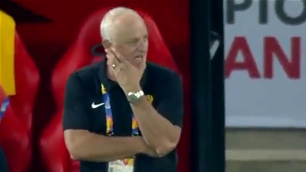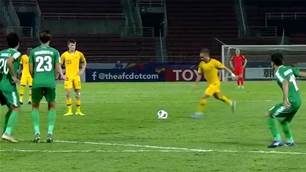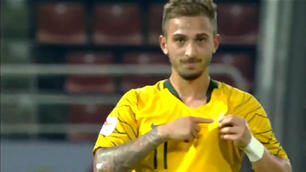It promised to be another supreme overachievement from the team that has brought hope and unity to a divided people...
The 18th edition of the Gulf Cup of Nations, held in the United Arab Emirates in January, was approaching its climax, with the final group matches set to decide the semi-finalists. Iraq, having earned a win against Qatar and a valuable point against Bahrain, stood alongside Saudi Arabia at the top of the group. Bahrain and Qatar were playing the other match, with both teams languishing three points behind. It would take an unlikely series of results for Iraq to be knocked out.
In the Iraqi dressing room prior to the match however, something was awry. It appeared a country that has endured innumerable struggles in recent years, fighting adversity and obstacle, was not so well-versed in controlling its own fate. There were whispers of deals by the men upstairs, suggestions of pre-arranged results, doubts over team selection and nerves.
Distracted by this, the Iraqi players lost the match 1-0. Coach Akram Ahmed Salman used surprisingly defensive tactics, to the frustration of some of his players, and the side never got out of first gear. At least they were still in the semi-finals, or so they thought, as Bahrain were struggling to beat Qatar at the same time. That is, of course, until Bahrain scored an injury time winner to knock Iraq out on goals scored.
As contentment within the Iraqis turned to disappointment, then frustration, then anger, the players and administrators turned on their coach. He was accused of costing the team victory, by deploying overly defensive tactics. Then things got stranger. An Iraqi TV station recorded comments from players Ahmed Kadhum, Emad Mohammed and Razzaq Farhan accusing the federation chairman of conspiring to end the match in a draw. The end result? The Iraqi Olympic Committee setting up a commission to investigate the claims. In April, the commission recommended the sacking of Salman, and two-year bans for the outspoken players. Unsurprisingly, no fault was found with the administration.
This scenario highlights the difficulties Iraqi football faces. In addition to the hindrance of the ongoing war in the country, administration’s endemic corruption has an effect on society that we may not be able to fully fathom. Football circles provide no exception. Iraq is potentially one of the best sides in West Asia, but without off-field stability, its promise will never be fulfilled.
While the war has raged for at least the last five years, the team has still managed to perform on the pitch. Their performance in the Athens Olympics by their U23 side was perhaps their highest profile success. An improbable semi-final appearance, after the side beat the likes of Portugal and even Australia, not only re-established the nation’s football credibility, it gave the country a much-needed feel-good story amidst its domestic turmoil.
Even more recently, the U23 side performed ably in the Asian Games in Qatar at the end of last year. Having only scraped through to the quarter-finals on goal difference, the side took it up a notch in the knock-out stages, bettering Uzbekistan and South Korea who had both until then won every match. In the final they surprisingly met hosts Qatar, who, with Iraq, were the two recipients of wildcards awarded to the best two performing second-placed teams from the six preliminary groups. But that was where Iraq’s run ended, falling 1-0.
Sadly the side’s Asian Cup campaign has been undermined. The Iraqi Football Association, after sacking Salman, failed to act quickly in appointing a replacement. The new coach Jorvan Vieira will have just a month to prepare his side, and bring together the players who ply their trades in more than half a dozen Middle Eastern leagues.
For a side that is favoured to go through to the second stage of the Asian Cup alongside Australia, these are concerning developments. The first fixture against Thailand looms as a massive danger match. The hosts, roared on by a boisterous home crowd, will have everything to play for. The Iraqis however, already bereft of the time to gel as a team, will also be under-prepared for the humid Bangkok conditions.
Much will be riding on the ability of Younis Mahmoud to find the net, after that two-year ban for fellow striker Emad Mohammed, who famously scored against Australia in the 2004 Olympics. Mahmoud is known as a flashy, direct yet sadly inconsistent striker, but one that is nonetheless capable of scoring great goals. The pressure will be on him to shoulder the team’s goalscoring burden.
Mahmoud, alongside Hawar Mulla Mohammed, Mahdi Karim and Nashat Akram heads a generation of Iraqi football full of promise. All have recently graduated from the Olympic U23 side that has performed so well both in the Olympics and Asian Games in the last few years. Their ability to play fast, physical football will ensure they give the defences of Oman and Thailand plenty of headaches, and Australia at least something to think about. Greater doubt exists around the make-up of the defence, following the suspension of Ahmed Kadhum and the new coach’s lack of time to prepare his side.
Yet we should remember that the Iraqis, have exceeded expectations before. A bit of adversity might be just what they need.
FourFourTwo verdict
Could cause an upset in the knockout rounds, but with poor preparation they might not even get there.
In the Iraqi dressing room prior to the match however, something was awry. It appeared a country that has endured innumerable struggles in recent years, fighting adversity and obstacle, was not so well-versed in controlling its own fate. There were whispers of deals by the men upstairs, suggestions of pre-arranged results, doubts over team selection and nerves.
Distracted by this, the Iraqi players lost the match 1-0. Coach Akram Ahmed Salman used surprisingly defensive tactics, to the frustration of some of his players, and the side never got out of first gear. At least they were still in the semi-finals, or so they thought, as Bahrain were struggling to beat Qatar at the same time. That is, of course, until Bahrain scored an injury time winner to knock Iraq out on goals scored.
As contentment within the Iraqis turned to disappointment, then frustration, then anger, the players and administrators turned on their coach. He was accused of costing the team victory, by deploying overly defensive tactics. Then things got stranger. An Iraqi TV station recorded comments from players Ahmed Kadhum, Emad Mohammed and Razzaq Farhan accusing the federation chairman of conspiring to end the match in a draw. The end result? The Iraqi Olympic Committee setting up a commission to investigate the claims. In April, the commission recommended the sacking of Salman, and two-year bans for the outspoken players. Unsurprisingly, no fault was found with the administration.
This scenario highlights the difficulties Iraqi football faces. In addition to the hindrance of the ongoing war in the country, administration’s endemic corruption has an effect on society that we may not be able to fully fathom. Football circles provide no exception. Iraq is potentially one of the best sides in West Asia, but without off-field stability, its promise will never be fulfilled.
While the war has raged for at least the last five years, the team has still managed to perform on the pitch. Their performance in the Athens Olympics by their U23 side was perhaps their highest profile success. An improbable semi-final appearance, after the side beat the likes of Portugal and even Australia, not only re-established the nation’s football credibility, it gave the country a much-needed feel-good story amidst its domestic turmoil.
Even more recently, the U23 side performed ably in the Asian Games in Qatar at the end of last year. Having only scraped through to the quarter-finals on goal difference, the side took it up a notch in the knock-out stages, bettering Uzbekistan and South Korea who had both until then won every match. In the final they surprisingly met hosts Qatar, who, with Iraq, were the two recipients of wildcards awarded to the best two performing second-placed teams from the six preliminary groups. But that was where Iraq’s run ended, falling 1-0.
Sadly the side’s Asian Cup campaign has been undermined. The Iraqi Football Association, after sacking Salman, failed to act quickly in appointing a replacement. The new coach Jorvan Vieira will have just a month to prepare his side, and bring together the players who ply their trades in more than half a dozen Middle Eastern leagues.
For a side that is favoured to go through to the second stage of the Asian Cup alongside Australia, these are concerning developments. The first fixture against Thailand looms as a massive danger match. The hosts, roared on by a boisterous home crowd, will have everything to play for. The Iraqis however, already bereft of the time to gel as a team, will also be under-prepared for the humid Bangkok conditions.
Much will be riding on the ability of Younis Mahmoud to find the net, after that two-year ban for fellow striker Emad Mohammed, who famously scored against Australia in the 2004 Olympics. Mahmoud is known as a flashy, direct yet sadly inconsistent striker, but one that is nonetheless capable of scoring great goals. The pressure will be on him to shoulder the team’s goalscoring burden.
Mahmoud, alongside Hawar Mulla Mohammed, Mahdi Karim and Nashat Akram heads a generation of Iraqi football full of promise. All have recently graduated from the Olympic U23 side that has performed so well both in the Olympics and Asian Games in the last few years. Their ability to play fast, physical football will ensure they give the defences of Oman and Thailand plenty of headaches, and Australia at least something to think about. Greater doubt exists around the make-up of the defence, following the suspension of Ahmed Kadhum and the new coach’s lack of time to prepare his side.
Yet we should remember that the Iraqis, have exceeded expectations before. A bit of adversity might be just what they need.
FourFourTwo verdict
Could cause an upset in the knockout rounds, but with poor preparation they might not even get there.
Related Articles

Champs and Chumps: Who impressed for the Olyroos?

Watch! Reno Piscopo lands stunner in Olyroos draw













